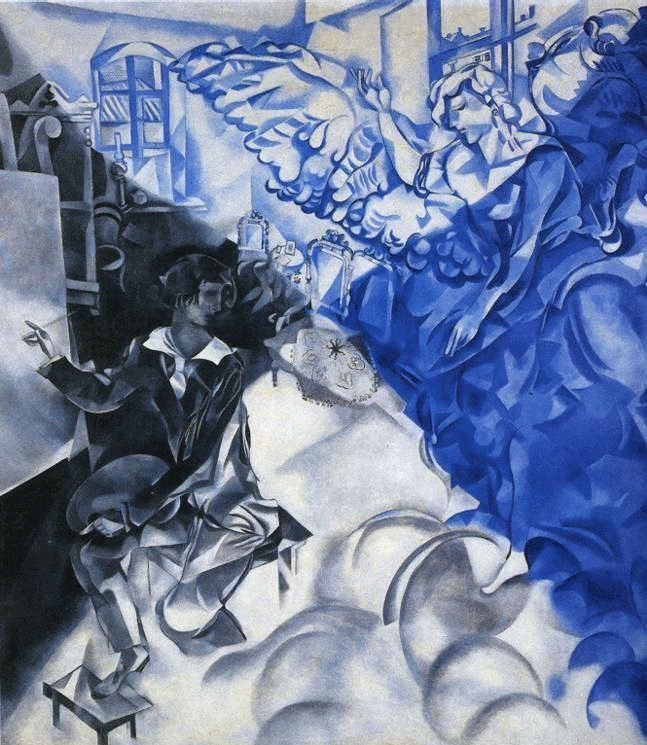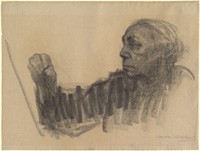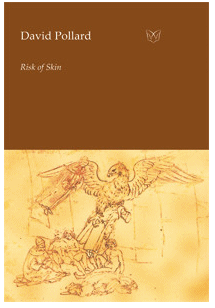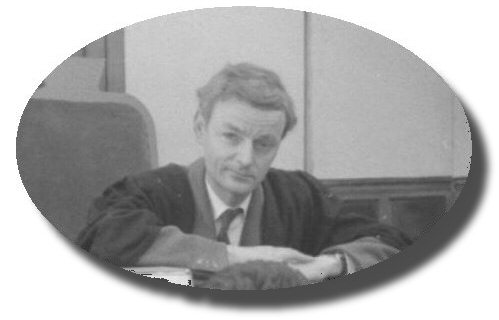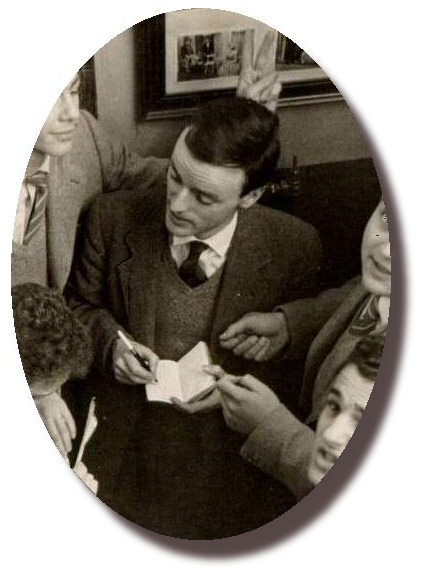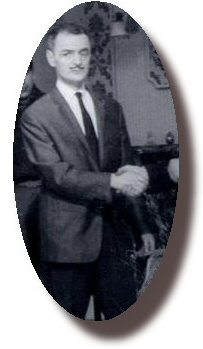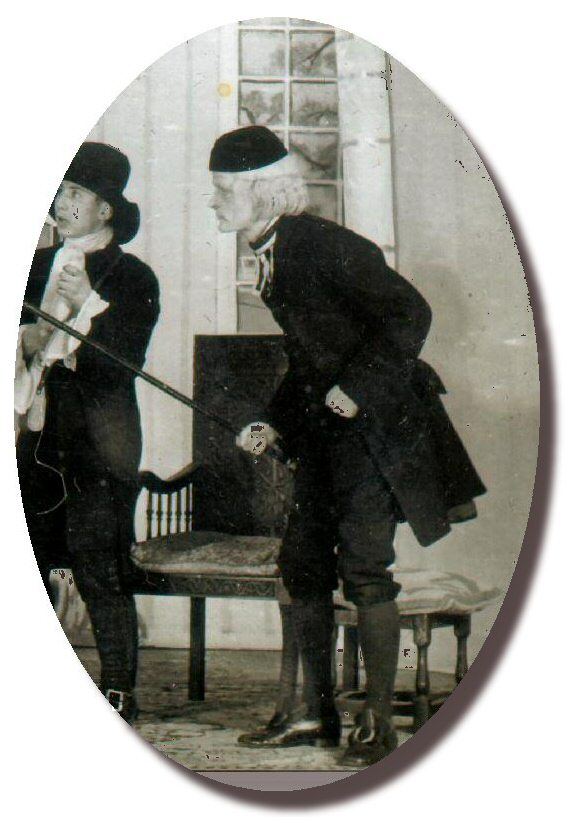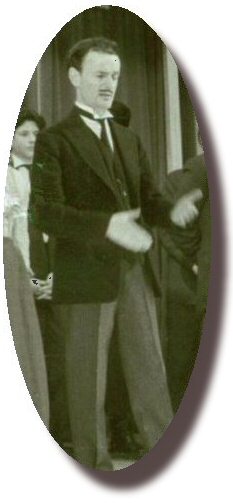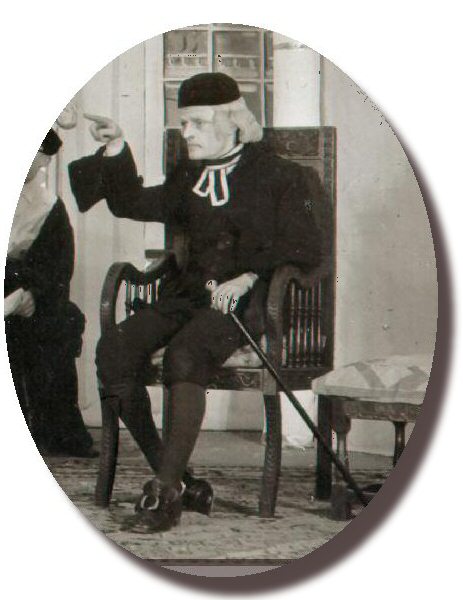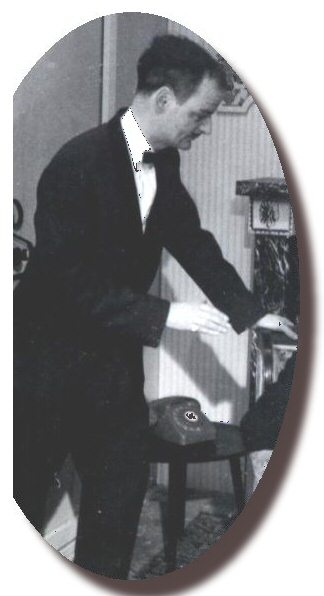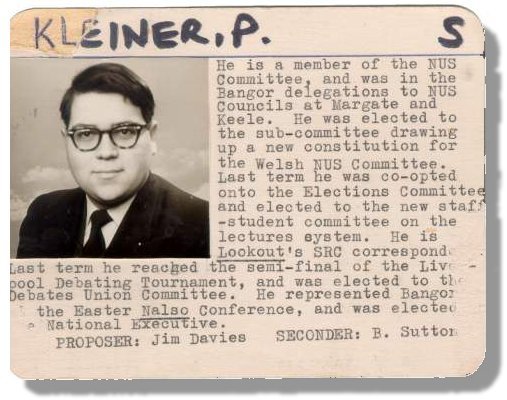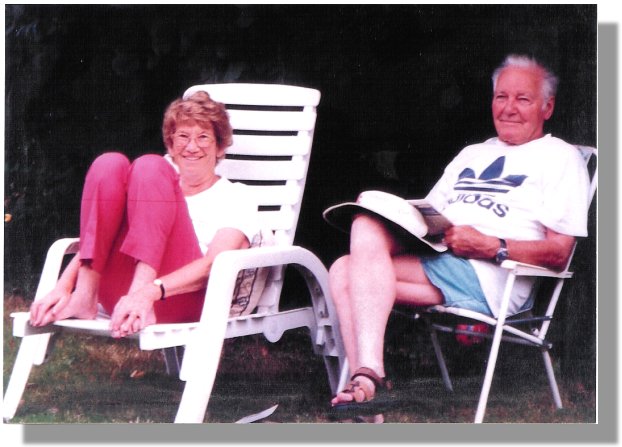|
BENJI FEUCHTWANGER
In June 200O Benji Feuchtwanger, a Whittingehamean from 1943-46, who
farmed in Gedera (South of Tel Aviv), died peacefully in his new
apartment near Dov Airport, Tel Aviv. Together with his loving wife,
Chava; the luxurious apartment had been carefully planned for
retirement, but he only had the pleasure of living in it for less than
one year. He contracted cancer for the second time in 10 years, fought
bravely, but was overwhelmed by its aggressive attack on his body.
He was a larger than life character, both physically and mentally. Like
so many of his generation his family came to Palestine in the early
1930's believing that their new country would succeed through hard
physical work. He was multi lingual. He spoke German, Yiddish, French,
English and Hebrew and Arabic. He was a passionate Zionist believing in
hard work and absolute integrity in his business dealing. He shared with
many of those who had left their European roots a liberal attitude
towards Arabs. He trusted and employed Arab families to live and work on
his farmland. He was proud to be their employer and trusted friend. On
many occasions he was called upon by them to be an adviser on family
and/or marital problems. He remained until his last years confident that
Israel could establish harmonious relations with its Arab neighbours and
people's other beliefs. The last time we met , October 1999, however, he
expressed for the first time, his concern that the new fanatical
'Jewish' religious sects whom we often had discussed and whom he
believed could be controlled by the democratic process were becoming a
serious threat to their host country and that Israel's democratic
political system which never anticipated their absurd behaviour was not
armed with the will or the authority to deal with them.
His father, Alfred, son of an eminent Berlin gynaecologist, was
consultant to the German Royal family before 1914, and became a Zionist
whilst studying at University. When Hitler came to power in 1933 he
immediately emigrated to Palestine. His father, together with a German
chemist, patented a technique for the economic reclamation of silver
from photographic waste film imported from Europe. Previously the
reclamation process had been too expensive to be worthwhile. The family
set up a chemical plant in the new town of Tel Aviv, from which
reclaimed silver was traded internationally. This led to the
establishment of the Feuchtwanger Bank which was a pioneer of the
present large Israeli financial industry. For a time after the
Declaration of Independence the Labour party swung further to the left
and Benj i's father became disheartened by the way the country's
finances were being handled. He was outspoken in his criticism and fell
out of favour with the Government of the time who fought back by
encouraging the popular press to pillory him as an avaricious
capitalist. Benji always said how hurt his father was by the way the
Socialists treated him. As a consequence he left his banking business in
Israel and lived and worked for the rest of his life in Switzerland.
Benji's maternal grandfather was also a Doctor of distnction. He carried
out research at Heidelberg Medical school. He published papers in the
1920's on the surgical treatment of cancer; his name was Dr. Hirsch. He
carried out research at Heidelberg Medical school. He published papers
in the 1920's on the surgical treatment of cancer of the breast. These
were revolutionary in so far that the Halstead operation, first
described in the 1890's and which is still being carried out, involving
total mastectomy, was challenged for the first time. He showed in these
early publications that the operation now referred to as Lumpectomy ,
whereby only the part of the breast affected by the cancer is removed
was as effective as the radical and disfiguring surgery of the Halstead
operation.
When Hitler came to power in 1933 Benji's maternal grand father was on
vacation in Switzerland. He telegraphed Heidelberg University to say
that he would be emigrating to Palestine. He never returned to Germany.
In the last ten years a German medical historian, writing a book on the
surgical treatment of breast cancer, contacted Benji asking for details
of his maternal grandfather and apologised for the way his grandfather's
eminence and research had been ignored by successive generations of
German doctors.
Like so many young Jewish Palestinians Benji wanted to leave the
traditional professions and work on the land. He went to a local
agricultural college and decided to come to Reading University, which,
after the Second World War, was internationally recognised as the best
European agricultural college. In 1943 he travelled to Liverpool with
his father on a British troop ship and then by train to Llanelli, the
nearest town to Whittingehame college. The intention was that he would
learn English and get the necessary qualifications to be enrolled as a
student in Reading University Agricultural College.
I first met Benji at Edwinsford, one week after he had landed in
England. On the first day of the Autumn term of 1943 we were the first
to arrive at the school. He spoke no English and was wandereing around
with a rubber pillow which had been left on his bed from the previous
term by a boy who was allergic to feathers. It was his only pillow and
not havig a cork he couldn't inflate it. His first words to me were
"Ich moechte gumi" "Ani rotzeh gumi" - literally
"I want rubber". I knew no German or Ivrit at the time but
realising the problem cut a twig of the appropriate gauge from a tree,
blew up his cushion, and stuck the twig in the cushion's orifice. Little
did I realise that this bit of innovation would be the beginning of a
close friendship which would last more than 50 years.
The early days of the foreign boys at Whittingehame were not easy. The
school was very British and quite arrogant about it. Benji, often
persecuted by the English boys for being foreign and by the other
Israelis for being fat (his compatriots called him 'Shemen', - 'Fatso').
He always said that I was his only friend in those early days ready to
fight his bullies.
In December 1946 we left school together. The pattern of Whitingehame
had changed radically when it left Wales in 1945. It was settling back
in Surrenden Road, Brighton, from where it had been evacuated in 1939.
Boys from the Middle East were arriving for an English education.
Whereas the indigenous pupils of Whittingehame had in the past, been
typical immature English schoolboys, the newcomers had often lived the
life of mature men, often have been trained in subversive underground
activities. Unlike the English boys, they were very sexually aware.
Nocturnal escapades through dormitory windows and down to houses of ill
repute, dance halls and 'Sherrys' night clubs were escapades undreamt of
by the likes of myself. - On my 16th. Birthday I was encouraged by one
Israeli student, Grunfeld, to celebrate with an escapade. Grunfeld had
been trained by and had undertaken missions with the terrorist
Organisation, Irgun Zvie Leumi. His parents, not wanting him to be
caught and possibly hung as a terrorist by the British, had sent him to
England for an education. On one of his first days at school he was told
to stand in line by the gym teacher, one Mr. Tucker. Grunfeld pulled out
a knife and challenged Tucker's authority to tell him what to do. Tucker
having been an unarmed combat instr-ucture during the war fortunately
knew how to deal with situations. We innocents watched as Grunfeld and
his knife parted company - knife flying in one direction and Grunfeld
through the air to land on his back on the parquet floor of the
corridor.
Grunfeld's advice on the night of my birthday was that 1 should
celebrate by going into Brighton, visit 'The Clock Tower Ballroom', a
local dance hall, where he would introduce me to some of his girl
friends.
His instructions were as follows. Leave outdoor clothes in the toilets
downstairs and when all the lights were out make a visit to the toilet,
change into outdoor clothes and exit through the toilet window. We would
meet later with others on the trolley bus. I was instructed to sit well
away from anyone I knew and not show signs that I could recognise anyone
of his group. Grunfeld's instructions were followed to the last minute
detail. All went well. After midnight Benji and I returned the way we
had come. In the toilet we changed back into pyjamas and crept back to
the dormitory. I found a body in my bed. To my horror it was Jake who
asked "where's yu bin?" - the only unconvincing reply I could
muster was "I went for a walk, Sir". Benji and I were demoted
that night from our prefects' duties and privileges and sent to sleep
with the juniors upstairs to be soundly reprimanded in Jake's study the
following morning.
Benji and I left school together in December 1946. 1 was 17 and he four
years older. I was destined to go into my fathers outfitting business -
a shop in Rochdale. Benji had found to his dismay that although accepted
for Reading, this University did not teach what he wanted to learn,
Mediterranean Agriculture. His father, a colleague of the Baron
Rothschild, had consulted the great land owner and it was decided that
Benji should seek his agricultural training in France. He knew not a
word of French and the Baron suggested that he should go to work in
Ferriere (40 Kilometres East of Paris) where Baron Rothschild had a
large agricultural Domain in the centre of which lies the 'Maison
Anglais' originally designed for Baron Edmund Rothschild by the same
architect who designed the Crystal Palace for the London, 1852
exhibition. Benji was to work on the farm and to take intensive French
language instruction to enable him to read and write and speak fluently
in one year so that he could be enrolled in a Southern French University
Agricultural College.
My career as an assistant in my father's outfitters shop in Rochdale
came to halt rapidly. I knew I was colour blind but the customers
didn't. In those days ladies would come in regularly to buy shirts and
ties to match their husbands complexions and suits. Ties were, like
shirts, kept in boxes on high shelves and not displayed openly as today.
It was the duty of the shopkeeper to climb up and down ladders
retrieving boxes which contained shirts and ties and advise on the right
material and combinations of colours. I was hopeless at this. One day I
was severely reprimanded by the local doctor's wife for not only
confusing her with the hundreds of ties I showed her, but above all for
putting her newly purchased stiff husband's Tuxedo in a small paper bag
so that when he took it out for the annual medical Ball it was cracked
across the front. My father, as always, was sympathetic when I told him
that I could not contemplate a life in an outfitters shop for the next
forty years. Not knowing what I should do I joined Benji as a worker on
Baron Rothschild's farm in France.
France in 1947 was devastated. 95% of the livestock including the horses
had been killed by the vindictive retreating German army. Food was
rationed - I paid for my accommodation with 7 pounds of coffee I brought
from England. The villagers who had collaborated were still being
shunned and were not welcomed in the village shops. They were always
served last wherever they went. Monsieur Dubois, the farm overseer had
never left the village in his 60 years, planned all work. Agricultural
machinery was being dragged by hand or bullocks. Benji and I worked and
talked hard about the future. Our only recreation was going for long
country walks. There were hardly any vehicles on the roads, and I only
remember meeting one of his acquaintances in the next village. Although
Benji had only been in France six months, his French was excellent. I,
who had learnt French verbs for four years at Edwinsford from an Irish
teacher, could never understand or make myself understood. To this day
when I try to speak any French I'm asked what part of Ireland I come
from. When the war of Independence broke out in 1948 Benji returned
immediately to Israel and being left on my own and being concerned about
a two year called-up for military service in England (compulsory
military service didn't finish until 1960) I made up my mind to return
home and become a medical student. Having left school at sixteen and
only having the equivalent of an 0- level I did not have a chance of
being accepted. Particularly as the policy of the Universities was to
fill 90% of their places with servicemen. I was told that if I could
pass the Higher School Certificate and pass my first year medical exam
(First M.B.) in one year - it was normally a three year course, before I
was due for my military service, I might get a place. To cut a long
story short, I did get to medical school and obtained a deferment from
military service, and qualified as a dentist in l955. I corresponded
with Benji during my years as a student and afterwards. His career had
taken him to South America to study cattle breeding. By selective
breeding he subsequently bred a small heard of cattle, partly from
Bramah stock, which could thrive in the dry climate of Israel. He was
subsequently sent by the Israeli government to Uganda with an
agricultural mission to advise the new country on streamlining their
cattle breeding industry. He travelled to Germany and became an agent
for a company manufacturing small tractors which could be used in
restricted land areas. Benji's cattle breeding projects in Gedera came
to an end when a treaty was signed with Rumania arranging for Israel to
buy meat from Rumania in exchange for permits allowing Jews to emigrate
to Israel. An American film company prolonged the life of the herd for a
short time by hiring them for a film set. He reverted back to growing
citrus fruit. In the 1980's the Spanish orange industry became ascendant
in the European market, the price of labour to pick the fruit in Israel
rose and the industry could no longer compete. As it became uneconomic
to grow grapefruits and oranges many of the old fruit trees were culled
and Benji turned his attention to developing fruit and vegetable
production.
It was not until 1967 that we met again. Benji was married to his lovely
wife, Chava. He had two daughters, Lilly and Shearer, exactly the same
age as mine. Chava was pregnant and later gave birth to their son, Ehud.
I went to Israel for the first time. I was with a Zionist mission. Benji
and I met again after twenty years by arrangement in a coffee bar in
Rehovat. In his old battered ex army Jeep we rode together through
country lanes to Gedera where I stayed on the farm for a couple of days.
We talked as if 20 years ago had been yesterday. Before I left we
visited Yad Mordechae. This is a moving museum village dedicated to the
kibbutzniks who held up the whole Egyptian army in the war of
Independence and thus stopped them joining forces in the North with the
Jordanians. The outcome of our meeting was that I bought an apartment in
Israel. Our two families spent happy times together in England and
Israel.
Having attended several Whittingehame reunions it is evident that many
old boys from that school have enriched their lives with the bonding of
a friendship similar to the one I describe above. I will always be
grateful to my parents for the opportunity they gave me to go to a
school which not only extended my horizons to enjoy a world outside the
very parochial upbringing of an orthodox English home situated in an
isolated Lancashire town, Rochdale, but gave me the opportunity to make
a friend of Benny, a perfect gentleman, an ideal Israeli citizen and a
man from whom I learnt so much.
I'm sure that all who remember Benji will join me in offering
condolences to his wife Chava, daughters, son and grandchildren.
Winston Senior, 1943-1946 |
